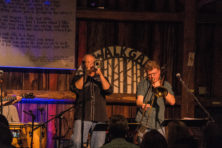The Glue That Holds a Performance Together
- Share
- Tweet
- Pin
- Share

Kaitlin Kitzmiller’s Stage Management
Any given theater production is put together by dozens of artists, performers and technicians, all working toward the common goal of putting on an excellent show.
Audiences taking in the final, breathtaking moments of Silent Sky at Peninsula Players Theatre in 2019 witnessed that coalescence profoundly when the actors, dressed in costumes housing hundreds of lights, delivered their final lines over a swell of music. When that music faded and the lights dimmed to nothingness for a final time, it was at Kaitlin Kitzmiller’s command.

Kitzmiller grew up with dreams of being a veterinarian in Omaha, Nebraska. This dream followed her through high school, but one year, when she had an extra credit to play with, she found herself stumbling into theater. In that class, she discovered a group of people she felt she belonged with, and along with them a great mentor: a new teacher.
“She was wonderful,” Kitzmiller said. “She made you feel seen and heard, which is really all a kid wants.”
Kitzmiller was a performer until her senior year, when a failed audition led her down a new path.
“[The director] let me do the audition again, and it still didn’t go well,” Kitzmiller said, “so she said, ‘Hey, our department is growing, and I need some help with this production. Do you want to help me out on the backstage side?’”
This was just the first of many times when Kitzmiller worked backstage as a stage manager, though she didn’t know that at the time. Her heart was still set on majoring in veterinary medicine when she was accepted to the University of Nebraska-Omaha.
“This is so silly,” Kitzmiller said, “but I tell people that my elbows started to itch three weeks into my summer vacation after graduating high school, and it was because I hadn’t done theater.”
One phone call with her adviser later, and she was a theater major.
Kitzmiller’s education put her in many roles, both on stage and off. Partnerships with local theater companies – including Nebraska Shakespeare, where she worked throughout her time at college – allowed her greater access to professional theater from the start.
“Theater is all about connections and meeting new people, and I got to meet so many great performers and technicians and, importantly, stage managers,” Kitzmiller said.
Those connections proved fruitful when two stage managers she worked with introduced the idea of applying for an internship at the Milwaukee Repertory Theater.
“That internship was great,” she said. “You eat, sleep and breathe theater.”
Kitzmiller’s internship led to an apprenticeship, and when a company member left to pursue work in Delaware, she followed and continued to hone her skills for two years. In Delaware, she took the next step in her professional career – perhaps the biggest leap a theater artist can take: She joined the Actors Equity Union.
“I used to joke, saying I will know I’ve made it in theater when I have insurance and a desk with drawers in it,” Kitzmiller said. “In Delaware, I had that. It was a super sweet gig.”
But Kitzmiller wasn’t happy being so far from friends and family. The next stop on her journey was Chicago, where she currently lives and works. She also headed north to Door County to work with Peninsula Players Theatre.

“Peninsula Players is like summer camp for theater people,” Kitzmiller said. “You’re in the middle of the woods, disconnected from technology at times, but you can always rely on the community there.”
The Drowsy Chaperone was the first of five shows she stage-managed for Peninsula Players.
Being a stage manager means different things for different theaters. The type of production and whether it’s Equity also alter the stage manager’s duties. There are constants, but flexibility is key.
“When people ask me what I do, I say I’m a stage manager, which is kind of like being a project manager for a play,” Kitzmiller said. “It’s our job to facilitate and help bring all of these people who are working on one production – both technically and artistically – to one goal.”
Every production is a massive collaboration, and a stage manager must keep all members of the team on the same page. For instance, if a director wants an actor to wear a hoopskirt, the stage manager lets the costume shop know, but the stage manager might also tell the scene shop, in case any doors need to be widened to accommodate the skirt.
Listening is important, and so is translation. Actors and directors may not speak their needs in a technical sense. Likewise, the backstage crew might ask for a blocking change that requires reinterpretation for the actors on stage. The stage manager bridges those communication gaps.
Equally important to the stage manager’s work is that of the assistant stage manager, who works alongside the stage manager during rehearsals. When the time comes to transition from rehearsals to technical implementation and performances, however, those two roles shift into something new and specialized.
At that point, the stage manager works with the tech team in the booth to run all of the technical elements of a show – the lights, sound, scene changes – and the assistant stage manager works backstage with the actors and stage crew to make sure the show runs smoothly physically and to be the stage manager’s backstage eyes and ears. If anything goes wrong during a performance, the two work together to solve those problems.
When the time came to execute the final cue to end a performance of Silent Sky, it was Kitzmiller who gave the “go” to the team in the booth and backstage, triggering a combination of lights, sound and elements both on stage and off, that left the theater poignantly dark and silent – if only for a moment – before thunderous applause.

